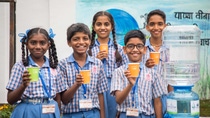Sustainability
Bringing Safe Drinking Water to Communities

The world's poorest people often pay the most – in terms of affordability -- for water. In Mumbai, clean drinking water could consume almost 15% of the income of low-income residents. In Turbhe Stores, a suburb in Navi Mumbai, the scenario is changing for the better now. A new collaboration initiated by BASF now offers purified drinking water to Turbhe Store residents at just 8 Indian rupees, or 11 US cents, per 20 liters.
The idea to provide access to inexpensive, safe drinking water was sparked in 2015, when BASF held a series of community dialogues seeking opportunities for social innovation. The dialogues convened a wide array of participants, including neighborhood representatives, the Navi Mumbai Municipal Corporation (NMMC), WaterLife India and the non-profit group STEP, which provides environmental engineering expertise.
The problem they were trying to solve: how to provide safe, affordable water and sanitation services to needy members of the community – with a business model that will sustain these services into the future. The solution? The Landmark Project.
The first phase of the Landmark Project started in August 2018. It has the capacity to provide clean, affordable water to 10,000 Turbhe Store residents via a water ATM – machine that purifies ground water and dispenses the purified water to individual containers. BASF runs the project on land provided by NMMC. WaterLife India has designed and is operating the solar-powered, cashless machines; and STEP is the implementing partner of the overall project including an awareness campaign
Uniquely, the input water for the project is ground water which is harvested from rain, then purified with various purification technologies including innovative ultrafiltration technologies from BASF. Residents access the purified water with a prepaid card. The revenue created by the small payments will help to sustain the rainwater harvesting system and maintain the water ATM equipment over time. BASF will run the system for 2 years, then hand it over to a local community-based organization.
The second phase of the Landmark Project will refurbish a nearby public toilet facility and establish a hygiene project. With the implementation of phase 2, the project will cover all aspects of WASH – Water, Hygiene and Sanitation.
Dr. Ramaswami N. (IAS), NMMC Commissioner said, “This project is a great example of how innovative chemistry can enable simple and cost-effective technologies to offer clean water and sanitation facilities. We are glad that companies like BASF are taking the lead in providing solutions and encouraging such partnerships.”
Since the project was inaugurated, the registrations are slowly picking up and the ATM is now supplying water to 800-1000 people. BASF has also involved its own employees through corporate volunteering to create awareness amongst the community and beneficiaries.
“Our corporate purpose is to create chemistry for a sustainable future,” said Dr. Raman Ramachandran, Chairman and Managing Director, BASF India Limited and Head, BASF South Asia. “Doing this in a way that serves the needs of a deserving community is humbling and exciting – and a great example of what collaborating for sustainability can accomplish.”